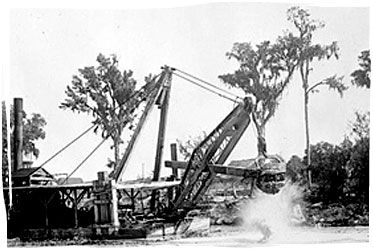History of Phosphate in Florida

Florida phosphate mining dates back to deposits first found in Alachua County, near Hawthorne, in 1883. In the early years, phosphate ore was collected out of the river by hand. Very soon, the mining was done the hard way with picks, shovels, wheelbarrows, strong backs, and sweat. Next came mule-drawn scrapers. Steam shovels appeared in the early twentieth century, not perfect tools by any means. But one steam shovel operated by three men did the work of 80 using hand tools. Gradually, the strip-mining techniques changed as technology "improved" and the industry spread. Nearly 30 tons of phosphate rock was dug out of 4,859 acres of Florida land in 2002. Today, the Florida phosphate industry owns or has mineral rights to 439,771 acres of Florida, an area nearly equivalent to two-thirds of the state of Rhode Island.
In Florida, the majority of phosphate deposits are found in Central Florida, but there are proposals to extend mining operations even further into Southwest Florida. According to the industry, Florida provides 75 percent of the nation's entire phosphate supply and 25 percent of the world's supply.
The vast majority of phosphate mined in Florida is shipped overseas—with China the single largest customer.
Today the phosphate industry in Florida employs approximately 3,900 people. The proposed new mines could add another 3,100 jobs. In the best-case scenario, that's little more than 7,000 jobs. By comparison, today, more than a million people make a living with industries dependent on the protection of our natural resources. That number is expected to grow. The economics of phosphate mining in Florida have changed. What we have to know now is, is it worth the risk? And, what will it cost us if we lose?
It's simple math. The environmental resources of the Peace River Basin contribute $5 billion annually to Florida's bottom line. The phosphate industry, statewide, contributes $500 million.